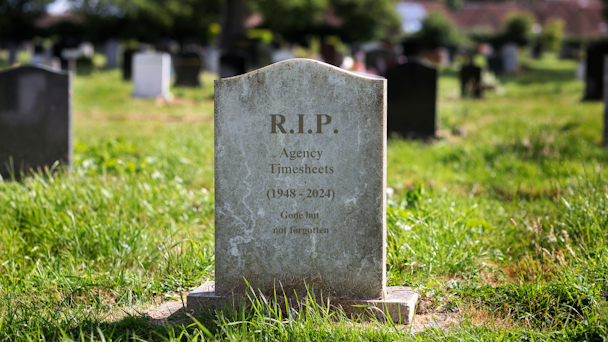In the age of AI, are the days of the agency timesheet numbered?
If the AI-powered future for agencies revolves around delivering client work faster and cheaper, we ask whether ‘time’ remains the best measure by which to cost projects, manage agency resources and create profit.

Are the days numbered for agency timesheets?
If the future currency of an agency is the ‘brains’ within it, where does that leave the humble timesheet? Love ‘em or hate ‘em (and most staff deplore them, BTW), timesheets have been a mainstay of the industry since David Ogilvy wrote ads. But, are their days numbered? If agencies create profit by (accurately) measuring the amount of time it takes to deliver their product or service, where is the sense in demonstrating how little time it takes to deliver said product or service thanks to AI?
Ed Palmer, managing director, St Luke’s: “As we continue to implement AI across all our workflows, agencies need to be on the front foot of how it gets reflected in our pricing. Are we going deeper? Are we generating more? Which outputs are getting better? How do we quantify this? Whatever innovative and exotic compensation model gets used, timesheets continue to have a critical internal role in the efficient running of an agency and the allocation of resources. So, it’s important to get the balance between enforcing timely and accurate completion of time sheets and not being a complete jerk about it. If anyone knows the answer, please let me know.”
Andrew Graff, CEO, Allen & Gerritsen: “We eliminated timesheets five years ago because modern marketing is about achieving specific, measurable results, not chasing people around over how they’re spending their day. We put our energy into rigorous scope management instead. That means starting with tangible outcomes that align everyone at our agency and client on what we need to achieve – shifting the time conversation to progress against the goal. Then, we design specific outputs with the talent and resources required. Because we know the value of work, we present fixed-price options that are easier for clients. The tangible scope makes our management objective, not subjective; the same goes for measurement. The faster marketing moves, the more essential fixed-price service becomes for both agencies and clients.”
Explore frequently asked questions
Cara Hyde, head of production, Brandwidth: “Timesheets help us see if our projects are tracking as planned and give us valuable data to see where our processes are working efficiently or where improvements need to be made. Remote working hasn’t increased the importance as it’s not a way to look at hour-by-hour output, but to continue to look at overall effectiveness and provide transparent data to our clients as needed. As we continually optimize how we work, whether that is by using AI, automating processes and project-to-project learnings, timesheet information is still important to be able to report on the improvements. We have introduced various ways to speed up timesheet entry, such as data in Outlook invites syncing with our timesheet system, and we will continue to look for ways to keep this process simple. But for now, timesheets are here to stay!”
Bob Briski, global SVP of AI, Dept: “Back in the 70s, there was a politician in San Francisco named Harvey Milk. Before he was elected, he was unknown and they were trying to get people to like him. He ended up running on the fact that he would fine people for leaving dog poop on the sidewalk since people hated stepping in it and there was no enforcement. He ended up winning. People are worried about AI stealing their jobs, but I think they’d love it if it took away timesheets. Timesheets could be AI’s dog poop moment.
Advertisement
Ed Davis, managing partner, Agency X, and director, BBN: “Many agencies insist on timesheets to ensure every minute worked is paid for – and because of a lack of trust in their employees. Timesheets can be useful for billing and productivity tracking, but there are also inherent drawbacks. We don’t use timesheets because we believe in treating our team members like the responsible adults they are. Our focus is on the quality and impact of the work, not hours logged. Our ideas and the work we create are what’s important. In the future, with the rise of remote work and AI-driven efficiencies, there will be much less reliance on timesheets and a greater emphasis on the outcomes delivered.”
Rebekah Renford, project director, Five by Five: “Yes, we still complete timesheets and remote working has no bearing on their importance. Like many agencies, we use effort estimation for operations and budgets, which makes timesheets key for tracking burn and maintaining financial balance. However, tracking a fixed number of hours can lead to presenteeism and employee stress, especially in remote work or under inexperienced leadership. A productive next step industry-wide would be to eliminate the requirement for a fixed number of hours to be logged each week and focus solely on tracking billable hours, allowing team members to concentrate on producing the best work for our clients rather than just filling time, and I think this would boost employee morale too. I think AI would be better used to improve agency profitability by helping teams do more with their time and be more creative rather than replacing human skills and insights. I certainly think many would prefer AI did our timesheets instead of our creative work!”
Advertisement
James Mooney, head of IT, The Kite Factory: “We continue to require timesheets from our team members and focus on the need for precision to ensure client profitability and efficient resource management. Remote work hasn’t lessened their significance at all, although in some cases, our billing doesn’t rely on time but varies based on different factors. We don’t anticipate that AI will take over timesheet tasks in the near or intermediate future. The key role for AI, from our perspective, is to enhance the services provided to our clients and to develop a tech stack that complements our processes, with the hope that this technology will alleviate our staff from routine duties so they can concentrate more on adding value for our clients.”
Niki Hutchinson, founder and MD, Larkhill PR: “Let’s face it, it’s a very rare occurrence for agency timesheets to be completed accurately and on time. I’ve lost count of the number of occurrences over the past 20 years that I’ve been on the finance team’s dreaded ‘Monday morning chaser email’ or at my desk last thing on a Friday, filling in four weeks of the suckers. This is why – alongside the fact we don’t bill by time – they are not part of the LarkHill PR daily task list. And, let’s be honest, the use of AI for efficiency in an agency makes no iota of a difference. That’s not to say we don’t see the value in them – we’re supposed to be a data-driven industry and, in theory, timesheets should offer invaluable insights that can be used to measure the success of campaigns or understand internal training needs. But until they are 100% accurate (or close to that), they are simply fact-less, which makes them a total waste of agency time.”
Suggested newsletters for you
Darryl Sparey, managing director, Hard Numbers: When we launched in 2020, we intentionally didn’t use timesheets or a time-based system for charging clients or monitoring our efficiency. Instead of focusing on the time it takes to do something for our clients, we focus on the outputs we create or the outcomes we deliver. This means we have an in-built incentive for innovation that almost every other creative services agency doesn’t. We make use of technology, including AI, to streamline research, outreach, reporting and overall business management. I like to think of ourselves as cautious techno-optimists: we embrace technology to enhance efficiency and automate routine tasks. We let the technology do the ‘grunt work,’ so our team can focus on the ‘front work’ – the higher value client-facing consultancy, counsel and care.
Daniel Maw, head of operations, Tall: “Timesheets are vital for profitability and business progression. Not only do they allow us to monitor profit and loss, but equally important, they enable us to learn from past projects to ensure we price future ones correctly. In the pursuit of delivering excellent work, managing and monitoring time and spending enables our superstar designers to push their creativity to new heights. Timesheets have always been a high priority for us and remote working hasn’t impacted how or why we use them. They remain a mechanism used to track how the team is going about their daily tasks. AI helps with efficiencies across the board and allows us to be more agile with budget spending for the remainder of the project because we’ve increased our efficiency. However, the fact remains that we still need to be able to track whether a project has been profitable or not.”
